I have a TIP42G PNP transistor, and when I used it, it instantly smoked. Would it be because I shorted the base directly to ground? (through a button for the initial turn on, and through a 2n2222 for it to stay on) It was powered by 4 1.3Ah NiMH batteries. The 2n2222 DID have a 1K base resistor @ 3VDC.
Asked
Active
Viewed 526 times
-2
tomnexus
- 7,617
- 3
- 19
- 35
Alexander M
- 613
- 2
- 7
- 19
-
Also, anyone know an 100% FREE alternative to circuit lab? – Alexander M Jan 04 '15 at 21:10
-
3This question is impossible to answer because you haven't shown us your circuit. Schematic please. – Matt Young Jan 04 '15 at 21:14
-
@ALEXANDER M LTSpice from Linear Technology is a free spice simulator. It has been freely available for nearly 10 years now. – caveman Jan 05 '15 at 00:28
-
3TIP42 needs a base resistor - for both 2N2222 and button use. Failure to provide one violates fundamental electronic design principles. – Russell McMahon Jan 05 '15 at 00:29
3 Answers
5
Yes, shorting the base directly to ground is a Very Bad Idea, especially with that much current available from the batteries. Use a series resistor to limit the current.
Dave Tweed
- 168,369
- 17
- 228
- 393
-
-
Rather put it between the Q2 collector & switch, and Q1 base. Otherwise the 3V won't turn on Q2 properly. – tomnexus Jan 04 '15 at 21:39
1
Yes, it's the switch. You need a base resistor for Q1, otherwise the base current will be unlimited when the switch is closed. Q2 might also pass enough current to damage Q1.
The NiMH batteries are capable of a lot of current, they probably turn a fast failure into an instant failure.
Add a 1k resistor between the base of Q1 and the switch/Q2 combination, or 220 ohms if you expect to draw a lot of current.
tomnexus
- 7,617
- 3
- 19
- 35
-
There won't be an 0.6V drop across Q1 - maybe 0.2V as long as the new resistor supplies enough base current to saturate it (5-10% of the load current). It's not an emitter follower, where Vb=Vcc and Vbe would cause such a drop. – Jan 05 '15 at 00:39
-
Right, I forgot that. It was covered [here](http://electronics.stackexchange.com/questions/12477/how-do-bjt-transistors-work-in-a-saturated-state). Thanks! – tomnexus Jan 05 '15 at 02:38
0
TIP42 needs a base resistor - for both 2N2222 and button use.
Failure to provide one violates fundamental electronic design principles.
Russell McMahon
- 147,325
- 18
- 210
- 386